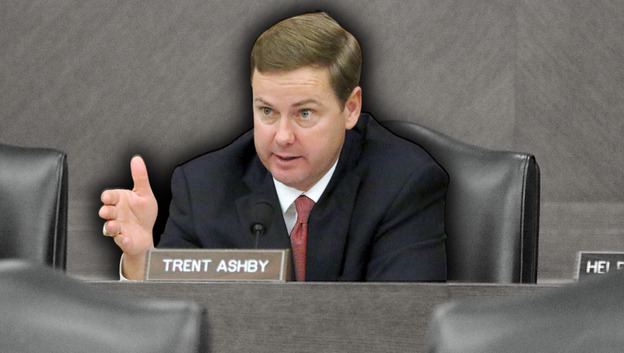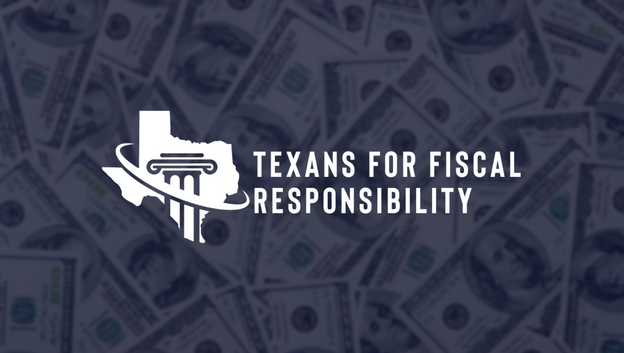
The Texas House Appropriations Committee met Wednesday in what is likely to be the last public hearing they have before the next legislative session, which is set to begin in January of 2023.
One of the items discussed was an update from the newly created Broadband Development Office (BDO), which came about from the passage of legislation in the 87th Legislative Session and was an emergency legislative item of Texas Governor Greg Abbott’s.
The author of that legislation was Republican State Rep. Trent Ashby (Lufkin), who boasts a dismal career rating of an “F” on the Fiscal Responsibility Index. In the hearing, he took the opportunity to give his thoughts on how free-market economics comes into play as Texas taxpayers foot the bill for broadband expansion all over the state. At issue is the concerning role he thinks “incentives” provided by the government (i.e. taxpayers) play in his definition of free-market economics—or in other words, how he thinks the government picking winners and losers in providing broadband services somehow serves the purposes of the free market.
For context, Ashby’s statement comes after a conversation with another Appropriations Committee member, Republican State Rep. Matt Schaefer (Tyler), and a representative from the BDO related to the company StarLink, using it as an example of the free market providing broadband internet service to a place that had previously not had that connectivity.
Ashby’s Statement
Ashby had this to say:
“You know, there’s a reason why there’s—especially when you look at the map, the broadband map that’s been published—that east Texas, south Texas, and El Paso in particular, those areas, and we have millions of Texans that have no access to internet, much less broadband, so I don’t think we can just sit here and say that there’s a market-based solution. There is a market-based solution, but it evidently is going to require some [incentivization] or some incentives, and so I think that’s the whole point here, is that we need to be technologically agnostic to the chairman’s question because what works in Lufkin, may not work in El Paso, may not work in Austin or Tyler, so we need to let the market decide that, ands that’s why I was pleased to see the Comptroller Hegar pen that letter to the Texas delegation, you know, basically saying, asking us to do the same thing Congress asked the feds and the bureaucracy to do, which is let’s let the market decide who the winners and losers are in terms of broadband providers, and so that hasn’t changed, that’s where we are as a state, but I think the Chairmans right it is going to take all hands on deck approach and letting our ISPs [Internet Service Providers] dictate the solution to this question, because the goal here, I think is simple, we want all 30 million Texans connected to broadband, that’s the goal here and you know I loved, I loved the question Chairman Bonnen asked about you know, if you had all the money in the world, you know, how long will it it take, because ultimately that’s where a lot of people are is regardless of your zip code, you know, broadband is not a luxury, it is an essential part of our daily lives now and just because we live out… they also deserve access to a quality education and prospects to make a good living and be a productive citizen, and so we as Texans..we have an opportunity to stand up and take advantage of this money that’s coming down and maybe make some strategic investments.”
The BDO was established to award grants, loans, and other financial incentives to expand broadband services in underserved areas. In response to funding that came from the American Rescue Plan Act (ARPA) passed by Congress in 2021, state lawmakers passed legislation in the third-called special legislative session appropriating $500,475,163 to promote and expand broadband services throughout the state of Texas via the Texas Comptroller’s Office, to which the BDO is attached.
It is already problematic that taxpayer dollars are going to provide private companies with investment money to “incentivize” them to build out infrastructure to areas of the state which the market has decided not to, for whatever reason. But to also have a state lawmaker (who sits on a committee charged with appropriating taxpayer money) not understand how basic free-market economics works and then provide potential cover for additional “incentives” (corporate welfare) to potentially expand this program next legislative session is concerning, to say the least.
Perhaps this exchange better explains Ashby’s dismal Fiscal Responsibility Index rating, but it most certainly reinforces the need for Texas taxpayers to be vigilant. Lawmakers are already creating the narratives to justify their potential use of the projected $27 billion surplus for things other than true property tax relief while potentially expanding the state budget for the next two fiscal years beyond a conservative size and scope.
What is Next?
The next legislative session is set to begin in January of 2023. Your elected officials need to hear from you.
How can you help? Go read the Texas Prosperity Plan for yourself and voice your support for banning taxpayer-funded lobbying, eliminating the property tax, and freezing state spending by signing up to support the TPP. Sign up for The Fiscal Note to stay up to date on all fiscal issues that affect Texans, especially our broken property tax system. We CAN put Texas on a path to fiscal sanity and future prosperity if we amplify our voices loudly enough.




